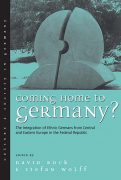Ethnic cleansing has been one of the phenomena that have shaped the 20th century from its first decade to its last, and Europe continues to have to deal with the consequences of forced population transfers. One of the most significant events of this kind has been the expulsion of over 12 million ethnic Germans from Central and Eastern Europe between 1945 and 1950 and the subsequent emigration of another four million in the second half of the twentieth century. Although unprecedented in its magnitude, conventional wisdom has it that the integration of refugees, expellees, and Aussiedler was a largely successful process in post-war Germany.
While the achievements of the integration process are acknowledged, the volume also examines the difficulties encountered by ethnic Germans in the Federal Republic and analyses the shortcomings of dealing with this particular phenomenon of mass migration and its consequences. The political, legal and social macro-analyses of the integration process in part one of the volume are complemented by contributions in part two which examine the way in which individuals have coped with life in a German minority community and subsequent expulsion or emigration to Germany. In combining these two perspectives, Coming Home to Germany provides a comprehensive picture of the successes and failures of half a century of Germany’s policies aimed at the integration of ethnic Germans from Central and Eastern Europe.
… a compelling investigation [that] unites political and policy analysis … with cultural criticism and primary sources. German Studies Review
[This] collection has many strengths. It provides a handy, concise introduction to a wide range of topics. The chapters are written in clear, lucid prose, and they reflect extensive research and expertise. … The book should prove very useful for advanced students and others interested in the integration of ethnic German expellees and re-settlers in post-1945 Germany. H-German
The book addresses an important subject … [and] provides new insights into the social, political, and economic challenges the expellees posed to the rival German states and sheds light on the contentious issue of German citizenship. The International History Review

